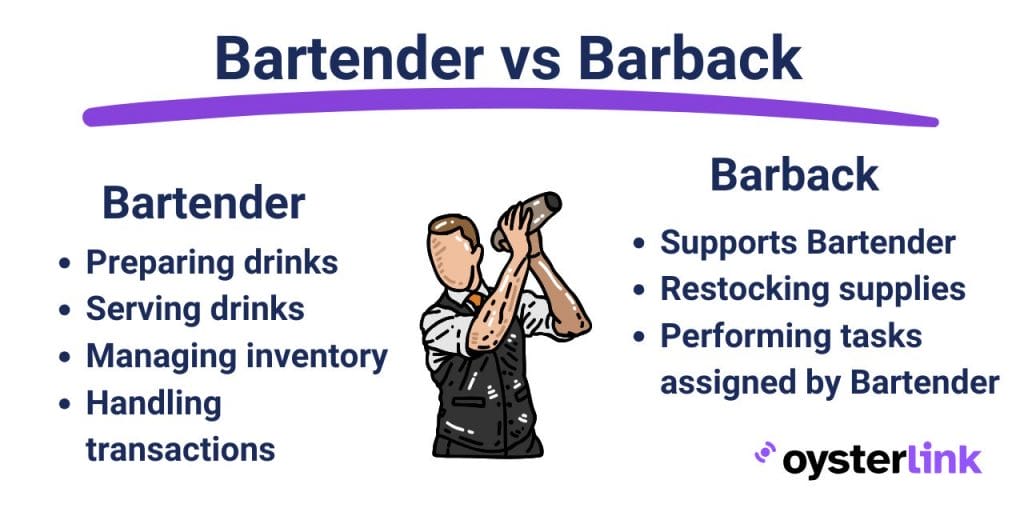Did you know that most Bartenders start their careers as Barbacks? While these roles are closely related, they have distinct responsibilities that are crucial to the efficient operation of any bar.
In this comprehensive guide, we’ll see the differences in the duties of Bartenders and Barbacks, highlighting what makes them unique and the essential skills required for each position.
What’s a Bartender?
A Bartender is the front-of-house professional responsible for preparing and serving drinks to customers. Beyond mixing cocktails, Bartenders often manage inventory, handle cash transactions and oversee Barbacks to ensure smooth operations.
What’s a Barback?
A Barback acts as the Bartender’s assistant, ensuring that the bar runs efficiently. Their tasks include restocking supplies, cleaning, preparing garnishes and occasionally serving drinks, provided they meet the legal age and requirements for alcohol service.
Duties and Responsibilities of Bartender vs Barback
Both roles are interdependent, working together to maintain a seamless bar experience. While their duties may overlap during busy periods, each position has specific responsibilities:
Key responsibilities of the Bartender position
- Drink preparation and service: Crafting and serving a variety of beverages, from classic cocktails to custom creations.
- Customer interaction: Engaging with patrons, taking orders and providing recommendations to enhance their experience.
- Inventory management: Monitoring stock levels of liquor, mixers, and other bar essentials to prevent shortages.
- Cash handling: Processing payments accurately and efficiently, including cash and card transactions.
- ID verification: Ensuring customers are of legal drinking age by checking identification, as mandated by training programs like ServSafe and RBS.
- Bar maintenance: Keeping the bar area clean, organized and well-stocked throughout the shift.
Key duties of the Barback position
- Maintenance tasks: Performing minor repairs or maintenance, such as unclogging sinks or restocking napkins and straws.
- Stocking supplies: Ensuring the bar is equipped with sufficient liquor, beer kegs, bar glassware, ice and garnishes.
- Cleaning duties: Collecting and washing used glassware, maintaining cleanliness of the bar area and disposing of trash.
- Assisting Bartenders: Supporting Bartenders by replenishing supplies, preparing garnishes and handling tasks that allow Bartenders to focus on customer service.

Key Skills for Bartender vs Barback
While both roles require strong communication and organizational skills, each position demands specific abilities.
Skills required for Bartending
- Mixology expertise: Proficiency in creating a wide range of cocktails and understanding flavor profiles.
- Customer service: Ability to engage with patrons, handle complaints gracefully and provide a welcoming atmosphere.
- Upselling techniques: Encouraging customers to try premium products or additional items to boost sales.
- Cash handling: Accuracy in processing transactions and managing a cash register.
- Flair bartending: Performing bartending tricks with bar tools to entertain and enhance the customer experience and potentially increase tips.
Skills required for Barbacking
- Teamwork: Collaborating effectively with bartenders and other staff to provide excellent service.
- Physical Stamina: Capability to lift heavy items like kegs and stand for extended periods.
- Attention to Detail: Maintaining cleanliness and organization to ensure a smooth workflow.
- Adaptability: Quickly responding to the dynamic needs of the bar during busy times.

Career Progression from Barback to Bartender
Many individuals begin their careers in the bar industry as Barbacks, providing them with foundational knowledge and experience. This role offers valuable insights into bar operations, inventory management, and customer service, serving as a stepping stone toward becoming a Bartender. The duration of this progression varies, typically ranging from six months to two years, depending on individual performance and the establishment’s needs.
Training and Certification Requirements
While formal education is not always mandatory for Bartenders or Barbacks, certain certifications can enhance employment opportunities and ensure compliance with local regulations. Certifications such as Responsible Beverage Service (RBS) or ServSafe Alcohol demonstrate knowledge in responsible alcohol service and legal compliance. Some establishments may require these certifications, while others provide on-the-job training to equip staff with necessary skills and knowledge.
In our complete Bartender guide, we detail how you can get a job as a Bartender without any previous experience. We also compare various methods such as courses, certifications and even DIY learning with online videos.
Work Environment
Bartenders and Barbacks typically work in dynamic, fast-paced settings, including bars, restaurants and event venues. The environment often requires evening, weekend and holiday shifts, with extended periods of standing and physical activity.
Compensation Differences Between Bartenders and Barbacks
Compensation structures for Bartenders and Barbacks differ due to the nature of their responsibilities and customer interactions. Bartenders often receive a combination of hourly wages and tips directly from customers, sometimes earning more from tips than their base salary.
In contrast, Barbacks typically earn a base wage, which may be lower than that of Bartenders, and often receive a portion of the Bartenders’ tips as a token of appreciation for their support. Tip-sharing arrangements differ by establishment, typically ranging from 1-2% of sales or 5-20% of tips.
- The average Barback salary in the U.S. is $31,688
- The national average Bartender salary in the United States is $37,090
Challenges and Rewards of Each Role
Bartenders face the challenge of managing a high-pressure environment, interacting with customers, preparing drinks quickly and ensuring the bar is running smoothly. This role requires multitasking and strong customer service skills, but it also comes with high earning potential due to tips.
For Barbacks, the challenges are more physical — carrying heavy kegs, restocking supplies and maintaining the flow of operations behind the bar. While the rewards are typically fewer in terms of direct tips, Barbacks often gain valuable experience that can lead to bartending roles and higher earnings.
Bartender vs. Barback: Conclusion
Bartenders and Barbacks form a symbiotic relationship that is essential for the success of any bar. Many Bartenders begin their careers as Barbacks, gaining invaluable experience that prepares them for the complexities of bartending.
A proficient Barback not only eases the Bartender’s workload but also contributes to a more efficient and enjoyable customer experience, often leading to increased tips for both roles.
Here are the main takeaway points that answer the Bartender vs Barback debate:
- A Bartender is responsible for preparing and serving drinks directly to customers, managing inventory, and handling transactions.
- In contrast, a Barback supports the Bartender by restocking supplies, cleaning and performing tasks that ensure the bar operates smoothly.
Bartender vs Barback FAQs
A Bartender is responsible for preparing and serving drinks directly to customers, managing inventory and handling transactions.
In contrast, a Barback supports the Bartender by restocking supplies, cleaning and performing tasks that ensure the bar operates smoothly.
Yes, many Bartenders start as Barbacks. This role provides foundational knowledge and experience, making it a common stepping stone to becoming a Bartender.
While Barbacks primarily focus on behind-the-scenes tasks, they may occasionally interact with customers, especially when assisting bartenders during busy periods.
Tip-sharing arrangements differ by establishment. Typically, bartenders share a portion of their tips with barbacks, often ranging from 1-2% of sales or 5-20% of tips, depending on the bar’s policy.
Typically, barbacks do not prepare drinks. However, in some establishments, experienced Barbacks may assist with simple drink preparations, especially during busy periods, as part of their training to become Bartenders.
Many establishments hire Barbacks without prior experience, as the role is often considered an entry-level position in the hospitality industry. From there, Barbacks who prove themselves can transition to Bartenders.
Yes, working as a Barback is commonly viewed as a stepping stone to becoming a Bartender. The experience provides valuable insights into bar operations, preparing individuals for the responsibilities of bartending.
Barbacks support Bartenders by ensuring they have all necessary supplies, such as stocked liquor, clean glassware and prepared garnishes. This collaboration allows Bartenders to focus on customer service and drink preparation, leading to efficient bar operations.
We have an article outlining how to get a bartending license in the United States, as well as a complete guide explaining the differences between a bartending license and a bartending certification.
Bartenders generally earn more than barbacks because they receive tips in addition to their base pay, which can significantly boost their income. Barbacks, on the other hand, typically earn a lower wage since they do not directly receive tips, though they may sometimes share in the tips collected by Bartenders. Earnings for both roles can vary based on location, establishment and experience.

Written by Mitko Terziev
With over eight years of experience in the field, Mitko is a seasoned content specialist who has penned thousands of articles covering a wide array of topics. Before writing, he spent a few months working as a Bartender in one of the best bars in his hometown. In his free time, Mitko enjoys immersing himself in the worlds of gaming and nature.

Reviewed by Stefan Petrov
With over 10 years of experience as a writer and editor, Stefan has worked in the automotive, IT, health and hospitality industries. Familiar with Google Search Console and other SEO tools like Ahrefs and Semrush, Stefan uses his experience to create content that’s visually appealing to the user but also ranks in the SERPs.




